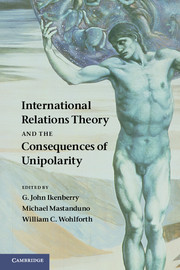Book contents
- Frontmatter
- Contents
- Figures
- Tables
- Notes on the contributors
- Notes on the editors
- 1 Introduction: unipolarity, state behavior, and systemic consequences
- 2 Unipolarity, status competition, and great power war
- 3 Legitimacy, hypocrisy, and the social structure of unipolarity: why being a unipole isn't all it's cracked up to be
- 4 Alliances in a unipolar world
- 5 System maker and privilege taker: US power and the international political economy
- 6 Free hand abroad, divide and rule at home
- 7 The liberal sources of American unipolarity
- 8 Unipolarity: a structural perspective
- 9 Unipolarity and nuclear weapons
- 10 From unipolarity to multipolarity: transition in sight?
- 11 Sell unipolarity? The future of an overvalued concept
- Index
- References
8 - Unipolarity: a structural perspective
Published online by Cambridge University Press: 05 June 2012
- Frontmatter
- Contents
- Figures
- Tables
- Notes on the contributors
- Notes on the editors
- 1 Introduction: unipolarity, state behavior, and systemic consequences
- 2 Unipolarity, status competition, and great power war
- 3 Legitimacy, hypocrisy, and the social structure of unipolarity: why being a unipole isn't all it's cracked up to be
- 4 Alliances in a unipolar world
- 5 System maker and privilege taker: US power and the international political economy
- 6 Free hand abroad, divide and rule at home
- 7 The liberal sources of American unipolarity
- 8 Unipolarity: a structural perspective
- 9 Unipolarity and nuclear weapons
- 10 From unipolarity to multipolarity: transition in sight?
- 11 Sell unipolarity? The future of an overvalued concept
- Index
- References
Summary
To say that the world is now unipolar is neither to praise American power, let alone its leadership, nor to accuse the United States of having established a worldwide empire. It is to state a fact, but one whose meaning is far from clear, as we have neither a powerful theory nor much evidence about how unipolar systems operate. A central difficulty for sorting this out entails determining the extent to which behavior and outcomes we have seen stem from structure, rather than from other levels of analysis, such as idiosyncratic aspects of the international environment, the American domestic system, and the role of individual leaders. How might the system function if the unipole were Nazi Germany, Stalin's USSR (or Brezhnev's), or a traditional autocracy? Or if it were the United States in a different era? There would surely be major differences, but we should still start our analysis with structure. In fact, this takes us quite far and, as well, to some unexpected places. Realism indicates that the unipole is likely to be difficult to restrain, no matter how benign its intentions or domestic regime. Furthermore, it is far from clear that it should seek to maintain existing arrangements. Both normal ambitions and, in the current context, American values and beliefs may lead the superpower to seek to change the system rather than preserve it.
World politics and the study of world politics
Academic analyses are influenced both by events in the world and by scholars’ political outlooks and preferences. The growth of realism was obviously entangled with the Cold War; revisionism about the origins of this conflict was sparked by the war in Vietnam (although this approach in fact was unable to explain the self-defeating American policy); the subfield of international political economy (IPE) developed rapidly in the wake of the American abandonment of the gold standard, the growth of OPEC, and the oil boycott following the 1973 Middle East War. The other side of this coin is that things that are not happening lead to subjects being ignored. The role of religion in international politics, for example, received little attention until the emergence of “political Islam.” Similarly, civil wars are important and interesting analytically but were intensively studied in the US only during the Vietnam conflict (when the subject was considered under the topics of “counter-insurgency” or “internal war”), falling back into quiescence until such types of conflict returned in the 1990s.
- Type
- Chapter
- Information
- Publisher: Cambridge University PressPrint publication year: 2011
References
- 6
- Cited by



